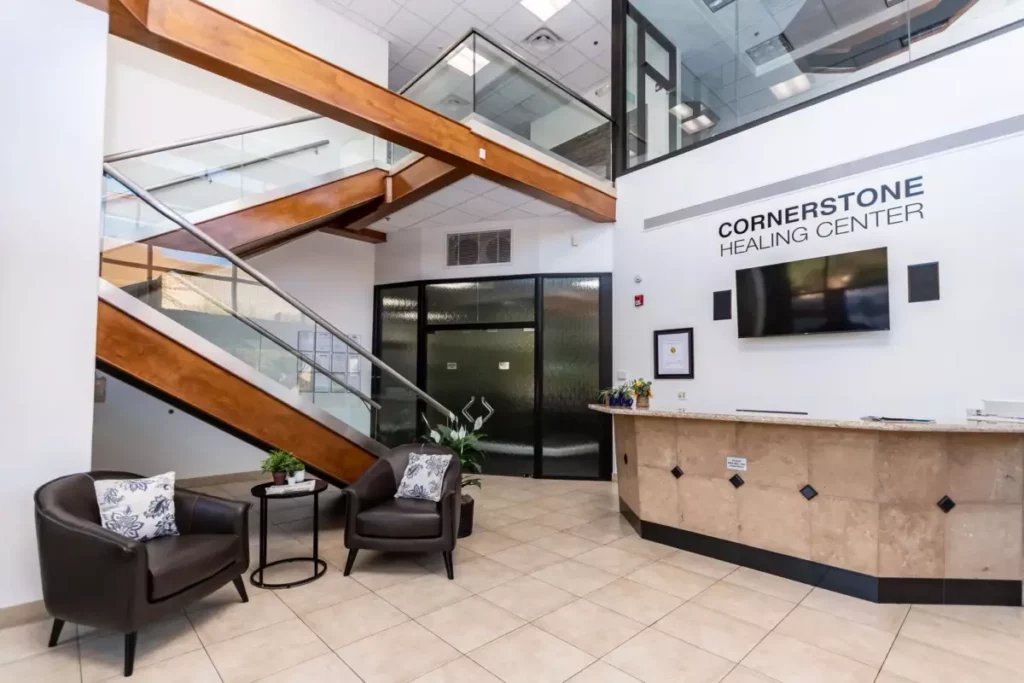Arizona Trauma Therapy and Treatment
Surviving trauma, especially in childhood or even adulthood, often leaves lasting impacts on mental health and emotional well-being. At Cornerstone, you’re not alone. We can help you heal.
Begin your insurance verification today

Living With Trauma
Traumatic experiences create feelings of ongoing fear, loss, and violation that can change brain wiring, relationships, and coping mechanisms over time. Survivors frequently struggle with symptoms like flashbacks, sleep disturbances, risky behaviors, and chronic health problems. Reactions can be triggered unexpectedly by situations far removed from the original Trauma, leading to confusion and exhaustion.
At Cornerstone, we understand and we are here for you. We’ll help lift you up and heal through our trauma programs and holistic therapies.
Childhood Trauma
Young children are more susceptible to developing trauma. Trauma disrupts the healthy processing of emotions, memories, and self-concept often fueling dissociation and lasting psychiatric issues. Childhood trauma also shapes personal identity and sense of safety in profoundly negative ways that permeate adult decisions and attachments.
Our clinicians also offer research-backed modalities that help patients develop self-compassion, process complex emotions safely, and rewrite narrative identity scripts along a healthier life trajectory.

Understanding Trauma
What is Trauma?
Types of Trauma
Trauma vs. PTSD
Trauma Responses
Risk Factors
Diagnosing Trauma
Trauma encompasses highly distressing or shocking events that overwhelm your ability to cope and self-soothe. It may be caused by a one-time occurrence like a car accident, act of violence, or natural disaster or involve chronic repeated exposures like ongoing abuse or wartime combat.
Key aspects of trauma center on the experience of intense fear, hopelessness, and loss of safety, paired with lasting neurological, sensory, and physical embodiments that may persist for years.
Trauma is not only a mental disorder. It can affect you in multiple ways, including:
- Physical Trauma: Injury or harm to the body, such as from accidents, falls, or physical assaults.
- Psychological Trauma: Emotional responses to distressing events, such as abuse, witnessing violence, or experiencing a life-threatening situation.
- Emotional Trauma: Involves feelings of helplessness, fear, or sadness caused by experiences like emotional abuse or neglect.
- Developmental or Childhood Trauma: Trauma experienced in early childhood, such as physical, emotional, or sexual abuse, or neglect, which can significantly impact emotional development.
- Complex Trauma: Repeated or prolonged exposure to traumatic events, often in situations where the individual feels trapped, like ongoing abuse or living in a war zone.
A person can have trauma, but not have PTSD. Trauma refers to an experience, while PTSD is a mental health disorder caused by extremely traumatic situations.
Trauma responses are the emotional, physical, and behavioral reactions that occur after an individual experiences a traumatic event. Some people may experience a temporary distress period, while others may struggle with lasting effects.
They can include:
- Fatigue
- Shock
- Disbelief
- Guilt
- Shame
- Anger
- Sleep disturbances
- Hypervigilance
- Avoidance and social withdrawal
- Depression
- Anxiety
Anyone can experience trauma, though how they handle it depends on their ability to cope. There are some risk factors, however, such as demographic factors like female gender, minority status, low income, and social isolation can increase your risk for trauma.
Individuals with prior mental health conditions, substance abuse, and a history of adversity in childhood tend to have lower resilience reserves as well.
Trauma severity directly correlates with the event—sexual abuse, violence, and combat involving actual or threatened death/injury most often cause severe trauma and/or PTSD.
Diagnosing traumatic stress conditions requires structured clinical interviews assessing event exposure history plus ensuing emotional, cognitive, behavioral, and physical disturbances. Our team will identify your trauma types and key details to gauge the severity of your experience while ruling out pre-existing issues versus precipitated conditions.
We delineate symptom profiles across PTSD criteria like flashbacks, avoidance, hypervigilance, dissociation, and mood changes to measure persistence, frequency, and level of disruption. Co-occurring major depression, panic disorders, substance abuse, and somatic complaints may surface as well.
Our Trauma Treatment Programs

Residential Programs
Our residential programs for trauma and PTSD provide around-the-clock care in a safe, supportive environment. With a mix of therapy, medication, and holistic approaches, this immersive program helps you address the core issues behind your trauma and develop lasting coping skills for long-term recovery.

Outpatient Programs
Our outpatient treatment for trauma provides flexible, part-time care, enabling individuals to focus on recovery while keeping up with daily responsibilities. With therapy, medication management, and supportive services, we guide you through your symptoms and recovery journey.

Virtual IOP
Our Virtual Intensive Outpatient Program (IOP) for trauma offers comprehensive, convenient support from the comfort of home. With individual therapy, group counseling, and secure online resources, it’s a great option for those who need flexible care but want the full support of a structured program.

Cognitive Behavioral Therapy
Cognitive Behavioral Therapy is a highly effective treatment for trauma. It involves identifying and challenging negative thought patterns and behaviors to alter unwanted thoughts.

Medication Management
Medication management is often used in conjunction with therapy. Medications can help regulate brain chemistry and alleviate symptoms.

Holistic Therapies
We emphasize holistic therapies that address the mind, body, and spirit. This can include mindfulness practices, yoga, and nutritional counseling. These practices help you to manage emotions and reduce stress. By focusing on being present without judgment, you can gain tools to break free from trauma, creating a strong foundation for recovery.






















Our Scottsdale Residential Treatment Center
Cornerstone has a Residential Treatment Center treatment located in Scottsdale, Arizona that offers lifesaving mental health treatment services.
The environment we create for you promotes healing and focus while also ensuring your comfort. We have group and learning rooms that provide space for collective therapy sessions and educational workshops.
We have individual therapy rooms that provide privacy and comfort for one-on-one sessions, allowing our clients to work with their therapists on resolving personal issues. You have access to a large fitness facility as well.
At Cornerstone Healing Center, we are committed to delivering a holistic approach to behavioral health treatment, blending comfort, therapy, and personal development for a full experience.
Our Treatments Approach to Trauma
Our Arizona Behavioral Health Center is designed to provide a supportive and safe space so you can heal at your own pace.
Integrative Approach
Our integrative approach addresses the physical, mental, and emotional sides of recovery, with a deep understanding of your trauma and triggers.
Dedication Clinical Team
Our team of dedicated specialists provide personalized, evidence-based treatment for trauma. We offer a confidential space to explore root causes.
Comprehensive Care
Our trauma treatment programs provide continuous, caring support tailored to your unique needs. We’re here to walk alongside you.
Broad Treatment Options
With a variety of care levels, we’re able to support you. Including residential, outpatient, and virtual care for trauma-related conditions.
What to Expect
- An assessment of your individual needs and goals to create a personalized addiction rehabilitation plan.
- A treatment plan for mental health or co-occurring (or dual diagnosis) behavioral health conditions.
- Evidence-based therapies include cognitive behavioral therapy, dialectical behavior therapy, and trauma-informed care.
- Holistic approaches include yoga, meditation, art therapy, and music therapy
- Nutrition counseling and physical fitness activities for overall health and wellness.
- Family involvement in the recovery process through Common Ground or family sessions.
- Aftercare planning that includes relapse prevention strategies for long-term success in sobriety.
Client Family Testimonial
Meet Our Arizona Treatment Team
Meet our experienced masters-level treatment professionals passionately dedicated to providing compassionate, expert care in our state-of-the-art rehabilitation facilities and recovery centers in Scottsdale, AZ and Phoenix, AZ.
Clinical Director of Scottsdale Program
Eboni Fields, MS LPC
Eboni Fields, MS LPC, is a seasoned Clinical Director who brings over a decade of experience in behavioral health and substance abuse. She is a licensed professional counselor with a Masters in Mental Health Counseling from Grand Canyon University.
More About EboniClinical Director of Phoenix Program
Nate Bush, LCSW
Nate began his recovery journey in 2010 and earned a Master's in Social Work from ASU. He’s been in the Behavioral Health field since 2013. Specializing in CBT, DBT, and grief, Nate is now the Clinical Director of our Phoenix program, underlined by his passion for helping others who struggled with substance abuse issues as he did.
More About NateWhen is inpatient or residential treatment appropriate for trauma?
Seeking timely professional assistance is advisable if you are experiencing:
- Flashbacks, intense emotional or physical reactions when reminded of Trauma
- Feeling constantly on guard, heightened startle response, sleep issues
- Acute emotional distress – anxiety, explosive anger, sadness, guilt
- Avoiding people/places associated with the Traumatic event
- Intrusive memories or dreams about what occurred
- Feeling detached, numb or that life has irrevocably changed
- Worsened functioning with work, relationships, health declining
- Ongoing symptoms without relief a month or more post Trauma
Getting ahead of post-traumatic stress can help prevent exacerbation and long term issues with early intervention therapies.
Am I covered with my policy?
Most likely, yes! Cornerstone accepts most major insurances. To be sure, you can fill out our commitment-free form to verify your coverage.
What level of care do I need?
Determining the appropriate level of care for Trauma treatment involves assessing:
- Safety risks
- Degree of disruption/impairment in relationships, work/school, self-care, finances
- Availability of social supports
- History of treatment compliance and efficacy of current interventions
- Diagnosed co-morbid conditions like PTSD, addiction, dand epression that necessitate simultaneous therapies
Let's begin the journey together
Frequently Asked Questions
Knowledge base
Trauma Information
Get Started Now
Call and speak with one of our caring team members about help for you or a loved one.













